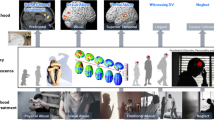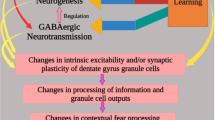Abstract
The present study investigated the acute and chronic effects of psychotropic drugs on maternal aggression in mice. All female mice had been singly housed since the end of the 4-day mating period. Behavioral testing for acute drug effects was carried out on postpartum days 5 and 7. Chronic drug treatment was started immediately after removal of the partner male, and was terminated on the 3rd postpartum day; behavioral testing was done on the 5th postpartum day. Acute administration of chlordiazepoxide (CDP; 5, 10 and 15 mg/kg, IP) showed a biphasic effect on maternal aggression; 10 mg/kg CDP significantly increased the frequency of bites, while 15 mg/kg CDP significantly decreased it. Imipramine (IMP; 5, 10 and 15 mg/kg, IP) decreased the frequency of bites in a dose-dependent manner. Haloperidol (HAL; 0.1, 0.2 and 0.4 mg/kg, IP) also decreased the frequency of bites dose dependently, but 0.2 and 0.4 mg/kg HAL decreased both the frequency and duration of locomotion. Chronic treatment with either CDP (5 and 10 mg/kg, IP) or HAL (0.1 and 0.2 mg/kg, IP) failed to alter the frequency of bites, while IMP (5 and 10 mg/kg, IP) decreased the frequency of bites. This evidence indicates that the antidepressant imipramine has a specific action in alleviating postpartum female aggression, and suggests that female aggression in mice is a useful tool for differentiating the actions of psychtropic drugs.
Similar content being viewed by others
References
Al-Maliki S, Brain PF, Childs G, Benton D (1980) Factors influencing maternal attack on conspecific intruders by lactating female “TO” strain mice. Aggress Behav 6:103–117.
Bond A, Lader M (1979) Benzodiazepine and aggression. In: Sandler M (ed) Psychopharmacology of aggression. Raven Press, New York, pp 173–182.
Brain PF (1981) Differentiating types of attack and defense in rodents. In: Brain PF, Benton D (eds) Multidisciplinary approaches to aggression research. North-Holland Biomedical Press, Amsterdam, pp 53–78.
Brain PF, Al-Maliki S (1979) Effects of lithium chloride injections on rank-related response in naive and experienced ‘TO’ strain mice. Pharmacol Biochem Behav 10:663–669.
Dean C, Kendell RE (1981) The symptomatology of puerperal illnesses. Br J Psychiatry 139:128–133.
Fredericson E (1952) Aggressiveness of female mice. J Comp Physiol Psychol 45:254–257.
Green JA (1978) Experimental determinants of postpartum aggression in mice. J Comp Physiol Psychol 92:1179–1187.
Ieni JR, Thurmond JB (1985) Maternal aggression in mice: Effects of treatments with PCPA, 5-HTP and 5-HT receptor antagonists. Eur J Pharmacol 111:211–220.
Krsiak M (1979) Effects of drugs on behaviour of aggressive mice. Br J Pharmacology 65:525–533.
Miczek KA (1987) The psychopharmacology of aggression. In: Iversen LL, Iversen SD, Snyder SH (eds) Handbook of psychopharmacology. Plenum Press, New York, pp 183–328.
Mos J, Olivier B (1987) Pro-aggressive actions of benzodiazepines. In: Olivier B, Mos J, Brain PF (eds) Ethopharmacology of agonistic behaviour in animals and humans. Martinus Nijhoff, Dordrecht, pp 187–206.
Ogawa S, Makino J (1981) Maternal aggression in inbred strain of mice: effects of reproductive states. Jpn J Psychol 52:78–84 15:883–886.
Olivier B, Mos J, Van Oorschot R (1985) Maternal aggression in rats: effects of chlordiazepoxide and fluprazine. Psychopharmacology 86:68–76.
Rodgers RJ, Waters AJ (1985) Benzodiazepines and their antagonists: a pharmacoethological analysis with particular reference to effects on “aggression.” Neurosci Biobehav Rev 9:21–35.
Sheard MH (1984) Clinical pharmacology of aggressive behavior. Clin Neuropharmacol 7:173–183.
St John RS, Corning PA (1973) Maternal aggression in mice. Behav Biol 9:635–639.
Svare B (1977) Maternal aggression in mice: influence of the young. Biobehav Rev 1:151–164.
Svare B (1981) Maternal aggression in mammals. In: Gubernick DJ, Klopfer PH (eds) Parental care in mammals. Plenum Press, New York, pp 179–210.
Svare B (1983) Psychological determinants of maternal aggressive behavior. In: Simmel EC, Hahn ME, Walters JK (eds) Aggressive behavior: genetic and neural approaches. Lawrence Erlbaum, Hillsdale, pp 129–146.
Valzelli L (1969) Aggressive behaviour induced by isolation. In: Garattini S, Sigg EB (eds) Aggressive behaviour. Wiley, New York, pp 70–76.
Yalom ID, Lunde DT, Moos RH, Hamburg DA (1968) “Postpartum blues” syndrome: a description and related variables. Arch Gen Psychiatry 18:16–27.
Yoshimura H (1987) Studies contrasting drug effects on reproduction induced agonistic behaviour in male and female mice. In: Olivier B, Mos J, Brain PF (eds) Ethopharmacology of agonistic behaviour in animals and humans. Martinus Nijhoff, Dordrecht, pp 94–109.
Yoshimura H, Watanabe K, Ogawa N (1988) Acute and chronic effects of ginseng saponins on maternal aggression in mice. Eur J Pharmacol 150:319–324.
Author information
Authors and Affiliations
Rights and permissions
About this article
Cite this article
Yoshimura, H., Ogawa, N. Acute and chronic effects of psychotropic drugs on maternal aggression in mice. Psychopharmacology 97, 339–342 (1989). https://doi.org/10.1007/BF00439447
Received:
Accepted:
Issue Date:
DOI: https://doi.org/10.1007/BF00439447




